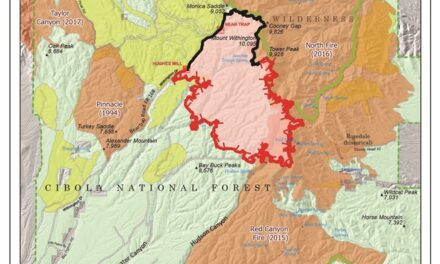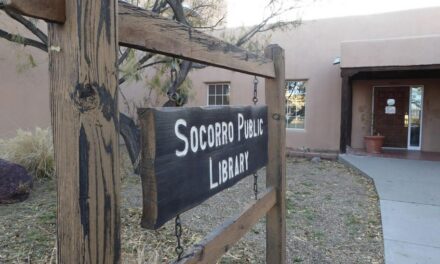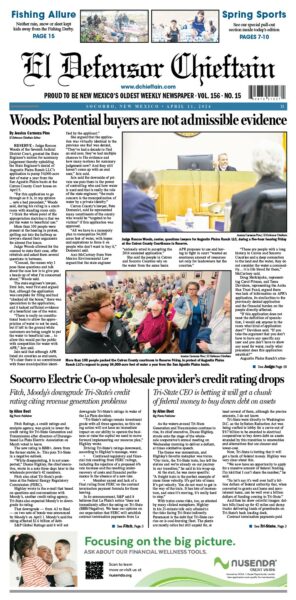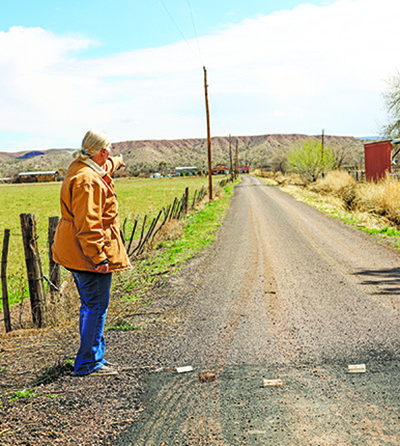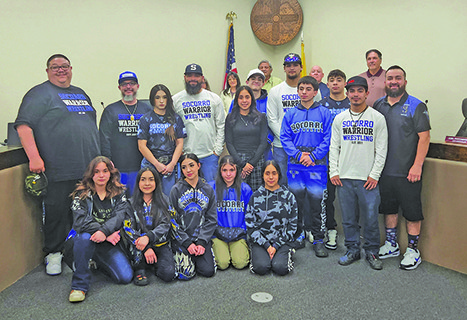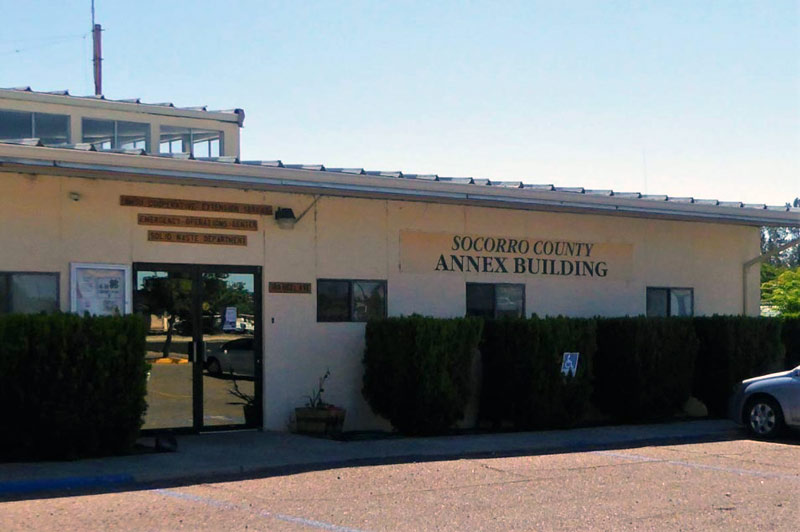
The Socorro County Commission meets in the County Annex building on Neel St. on the second and fourth Tuesdays each month.
Figuring out how to give county employees additional pay for working during a pandemic has been something of a logistical nightmare.
All county employees who were employed by Nov. 1 are eligible for premium pay, which is $13 an hour in addition to their regular pay, up to a maximum of $4,850. The county has 103 employees. The employees will have until Oct. 31, 2022 to earn the premium pay. Elected officials are not eligible for the premium pay.
The additional pay will be funded by American Rescue Plan funds and cost an estimated $499,850. The county will receive a total of $3.2 million in ARP funds. The county received $1.6 million in ARP funds in the spring and should receive the second half in spring 2022. The commissioners had already allocated all of the initial $1.6 million, but in late September decided they should reallocate some of the funds to offer county employees additional pay for working during the pandemic—following the lead of other entities like the Socorro School District.
Although the premium pay was implemented Nov. 1, the commissioners approved changes to the program in a special meeting on Friday, Nov. 5, after complaints from county employees.
The Socorro County Commissioners initially approved the premium pay during their Oct. 26 meeting. They directed County Manager Michael Hawkes to figure out the logistics of a premium pay program that would get full time employees as close to $5,000 as quickly as possible. At a previous meeting, Commissioner Manuel Anaya proposed the county spend $500,000 on premium pay, because that is the amount the commissioners allocated for business grants.
Originally, the premium pay began Nov. 1 and was supposed to run until Jan. 7. The timeframe of the original program meant that full time employees could earn a potential $5,200, while part time employees would earn a ratio of that amount, depending on how many hours they worked. Employees also would have to have worked for the county for six months by Nov. 1 to be eligible. That requirement has since been dropped.
In the first week of the program the commissioners were bombarded with phone calls and emails from county employees who were upset about how the premium pay was structured, said Anaya, so he called a special meeting Friday to discuss the issue.
In an Oct. 7 story, the Chieftain previously erroneously reported that the commissioners might use American Rescue Plan funds to offer county employees incentive pay for working during the pandemic, when in actuality the commissioners were considering, and have since approved, giving employees premium pay—a small difference in words but a significant difference in how the payments are structured.
Unlike the Socorro School District, which used American Rescue Plan funds to offer its employees incentive pay—a one time $5,000 payment as an incentive to continue or begin working for the school district, the county’s premium pay will be an additional $13 an hour for county employees, up to a maximum of $4,850.
“I thought that’s the road that we were headed down, was just a one time lump sum payment,” said Commissioner Joseph Gonzales during Friday’s special meeting. Gonzales asked if there was any way to offer county employees a one time payment.
The county is unable to offer a one time payment because the employees are not employed with a contract, so it would go against the rules guiding spending ARP funds, according to Hawkes and the county attorney.
The American Rescue Plan funds are bound by both the rules set down in the actual federal act and New Mexico state law. Under state law, the county cannot retroactively offer pay, explained county attorney Adren Nance. The pay has to be for when the program was authorized to begin, Nov. 1, going forward. Under the ARP rules, the additional pay has to be for actual hours at the workplace, so cannot be awarded when an employee is on sick leave, taking vacation time, on suspension or working from home.
Some of the complaints the commissioners received centered on employees having to choose between taking annual leave for holidays and working so they could earn the maximum amount of premium pay.
Hawkes recommended addressing this problem by extending the timeframe for earning the premium pay to Oct. 31, 2022, which the commissioners implemented. Extending the timeframe also addresses another area of concern about the original plan: not offering part time employees as much extra pay as full time employees. With the extended timeframe, part time employees should have the ability to earn as much of the additional pay as full time employees, although it will take them longer to do so. To stay in budget after this change, the county had to reduce the maximum amount of premium pay an employee could earn from $5,200 to $4,850.
Other complaints were more disturbing, according to Commissioner Ray Martinez.
“Some of the calls that I got were kind of disturbing because they were telling me that there’s some people that come to work late, some people go home early, some people don’t even show up and they’re still getting paid,” said Martinez.
Several commissioners, including Martinez, asked county employees who see their coworkers lying about their hours to follow the chain of command within their department and report the issue to their supervisor. Commissioner Glen Duggins took a different stance.
“Shame on us for not looking into that because we are responsible for taking care of the people’s money, this commission is, and if we know something like that’s going on there needs to be something done about that. We are responsible. The people have elected us to look over their money,” said Duggins.





